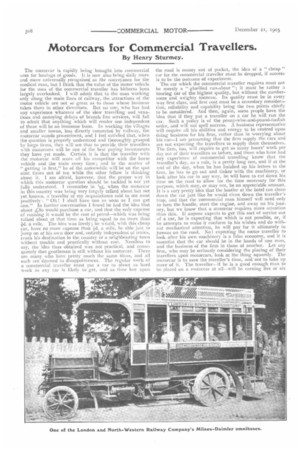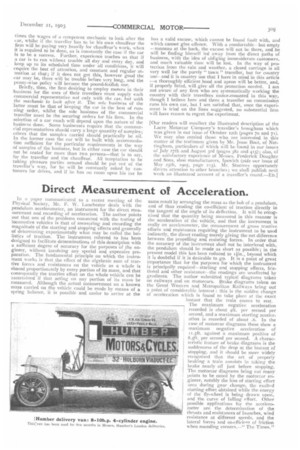Motorcars for Commercial Travellers.
Page 10

Page 11

If you've noticed an error in this article please click here to report it so we can fix it.
By Henry Sturmey.
The motorcar is rapidly being brought into commercial uses for haulage of goods. It is now also being daily more and more universally recognised as the conveyance for the medical man, but I think that the value of the motor vehicle for the uses of the commercial traveller has hitherto been largely overlooked. I will admit that to the man working only along the main lines of railway, the attractions of the motor vehicle are not so great as to those whose business takes them in other directions. But no one, who has had any experience whatever of the slow travelling and vexatious and annoying delays of branch line services, will fail to admit that anything which will render one independent of these will be an immense boon. In working the villages and smaller towns, less directly connected by railway, the motorcar stands pre-eminent, and I feel satisfied that, when the question is properly understood and thoroughly grasped by large firms, they will see that to provide their travellers with motorcars will be one of the best paying investments they have yet made. Certain it is that the traveller with the motorcar will score off his competitor with the horse vehicle and the train every time; and in the matter of " getting in first," he of the automobile will be on the spot nine times out of ten while the other fellow is thinking about it. I am afraid, however, that the proper way in which this motorcar question should be tackled is not yet fully understood. I remember in '95, when the motorcar in this country was being very largely talked about but not vet known, a traveller oi my acquaintance said to me most positively : " Oh! I shall have one as soon as I can get one." In further conversation I found he had the idea that about ..8(3 would purchase a car, and that the only expense of running it would be the cost of petrol—which was being talked about at that time as being equal to no more than id. a mile. The idea was lovely ; he would, with this cheap car, have no more expense than id. a mile, he able just to jump on at his own door and, entirely independent of trains, reach his destination in the country or a neighbouring town without trouble and practically without cost. Needless to say, the idea thus obtained was not practical, and consequently that gentleman is still without his motorcar. There are many who have pretty much the same ideas, and all such are doomed to disappointment. The regular work of a commercial traveller must put a rat to about as hard work as any car is likely to get, and as time lost upon
the road is money out of pocket, the idea of a " cheap " car for the commercial traveller must be dropped, if success is to be the outcome of experiment.
The car which the commercial traveller requires must not be merely a " glorified run-about "; it must be rather a touring car of the highest quality, but without the cumbersome and weighty tonneau. Its quality must be in every way first class, and first cost must be a secondary consideration, reliability and capability being the two points chiefly to be considered. And then, again, some people have the idea that if they put a traveller on a car he will run the car. Such a policy is of the penny-wise-and-pound-foolish order, and will not spell success. A business representative will require all his abilities and energy to be centred upon doing business for his firm, rather than in worrying about his car—I am presuming that the firm supply the cars and are not expecting the travellers to supply them themselves. The firm, too, will require to get as many hours' work per day out of their travellers as before, and those who have had any experience of commercial travelling know that the traveller's day, as a rule, is a pretty long one, and if at the end of the day, when he has finished up his letters to the firm, he has to go out and tinker with the machinery, or look after his car in any way, he will have to cut down his time on the road to allow for the time necessary for this purpose, which may, or may not, be an appreciable amount. It is a very pretty idea that the hostler at the hotel can clean down the car just like he would clean down the traveller's trap, and that the commercial man himself will need only to turn the handle, start the engine, and away on his journey, but we know that a motorcar requires more attention than this. If anyone expects to get this sort of service out of a car, he is expecting that which is not possible, or, if he attempts to make it conform to his wishes and do without mechanical attention, he will pay for it ultimately in panties on the road. No I expecting the motor traveller to look after his own machinery is a false economy, and it is essential that the car should be in the hands of one man, and the business of the firm in those of another. Let any firm, who may be seriously considering the placing of their travellers upon motorcars, look at the thing squarely. The motorcar is to save the traveller's time, and not to take up more of it. The traveller—if he is a good enough man to be placed on a motorcar at all—will be earning five or six
times the wages of a competent mechanic to look after the .car, whilst if the traveller has to be his own chauffeur rhe firm will be paying very heavily for chauffeur's work, when it is required to be done, as is constantly the case if the car is to he a success. Further, experience teaches us that if a car is to run without trouble all day and every day, and keep up to its scheduled time under all conditions, it will require the best of attention, and constant and regular attention at that ; if it does not get this, however good the -ear may be, there will be trouble before very long, and the pen%-wise policy will become the pound-foolish one. Briefly, then, the firm desiring to employ motors in their business for the uses of their travellers must supply each commercial representative not only with the ear, hut with the mechanic to look after it. The sole business of the latter must be that of keeping the car in the best of running order, whilst the sole business of the commercial traveller must be the securing orders for his firm. In the -selection of a car much will depend upon the nature of the business done. Some businesses require that the commercial representatives should carry a large quantity of samples; others that the samples carried should practically be nil. In the former case the car will be built with accommodation sufficient for the particular requirements in the way -of samples of the business, but in either case the car should not be seated for more than two persons—that is to say, for the traveller and the chauffeur. All temptation to be taking pleasure parties around should be put out of the traveller's way, for he will be constantly asked by customers for drives, and if he has no room upon his car he
has a valid excuse, which cannot be found fault with, and which cannot give offence. With a comfortablebut empty —tonneau at the back, the excuse will not be there, and he will be finding himself led away from the direct paths of business, with the idea of obliging inconsiderate customers, and much valuable time will be lost. In the way of protection from the rain and weather, a closed carriage is all very well for the purely " town " traveller, but for country use— and it is country use that I have in mind in this article —a thoroughly efficient hood and apron will be better, and, if properly fitted, will give all the protection needed. I am not aware of any firm who are systematically working the country with their travellers motor-mounted in this way, though I believe here and there a traveller on commission runs his own car, but I am satisfied that, once the experiment is tried on the lines suggested, no substantial firm will have reason to regret the experiment.
I Our readers will recollect the illustrated description of the Lacre Motorcar Company's traveller's brougham which was given in our issue of October 12th (pages 70 and 7i). We may also remind those who are interested in this matter of the testimony given by Mr. Jesse Boot, of Nottingham, particulars of which will be found in our issues of July 27th and August 3rd (pages 382 and 415); also, of the satisfactory experience of Messrs. Frederick Doughty and Sons, shoe manufacturers, Ipswich (vide our issue of May 25th, loos, page 215). Mr. Sturmey opportunely directs attention to other branches; we shall publish next week an illustrated account of a traveller's round.—ED.]


















